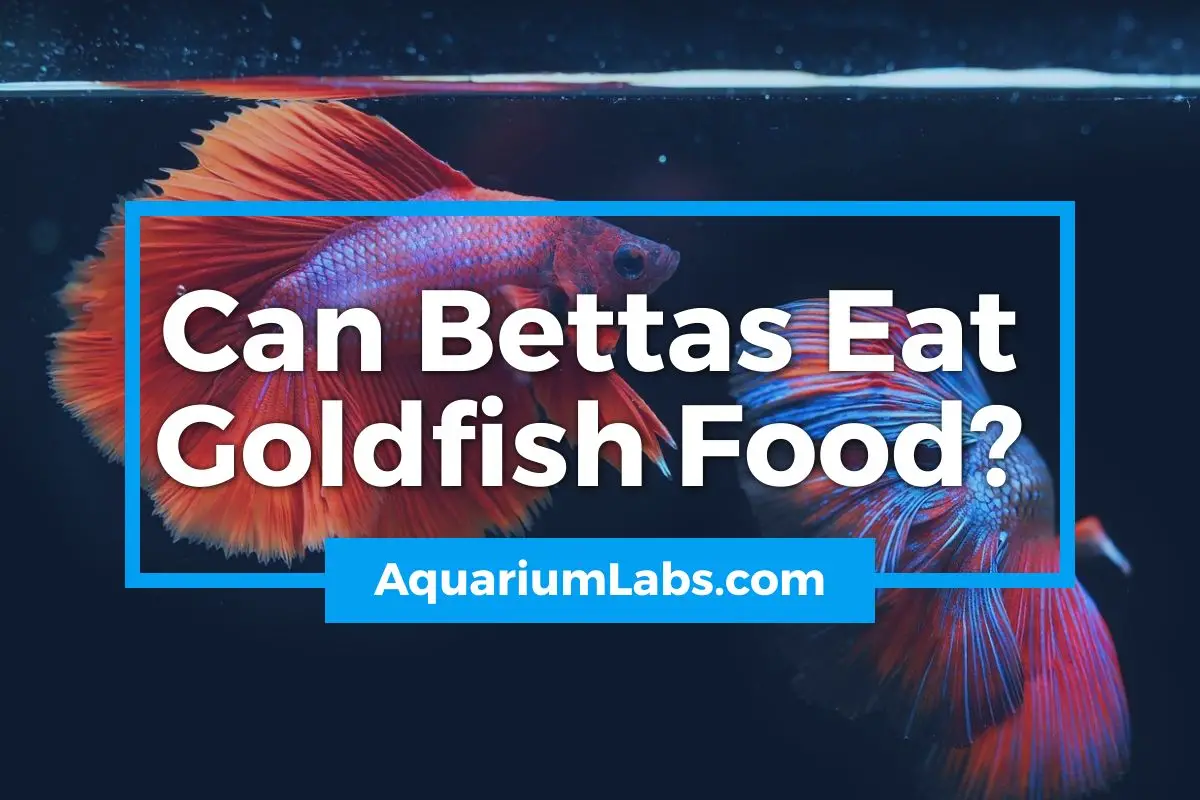Many fish food products may seem to answer the needs of all fish, but not just any fish food product should be fed to any fish. Some fish require more protein-rich food than others, while some need to eat food with a significant portion of plant matter.
There are many fish food, betta owners may wonder, “Can bettas eat goldfish food?”
This article answers that question and discusses other important things you should know about betta food.
Can Bettas Eat Goldfish Food?
Yes, Bettas can eat goldfish food. They can digest goldfish food and even survive on it. But it is not ideal to feed your betta fish with goldfish food. While they may eat the goldfish food, you can be sure that they will hardly benefit from it because the food will not suit the nature of their digestive systems.
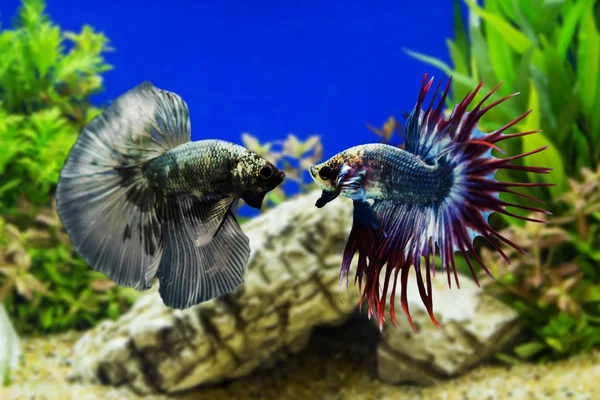
Feeding Bettas with goldfish food is like feeding grass to a carnivore. While some carnivores may eat the grass, you can be sure that the grass will not provide them with enough nutrients and is not the ideal food for their digestive system.
That is exactly what happens when you make your Bettas eat goldfish food. Unlike goldfish, which is an omnivore (but one that consumes a lot of plant matter), Bettas are significantly carnivores. Although goldfish food will keep them alive for a while, they will be malnourished in the end as that is not the ideal food for them.
Betta Food Versus Goldfish Food
Bettas are largely carnivorous in their natural environment, mostly insectivores. In the wild, they usually eat insects such as fruit flies, mosquitoes, and others when they try to lay their eggs on the after surface.
They also eat insect larvae such as mosquito larvae and others. They eat tadpoles (which goldfish eat too), invertebrates, other fish that are smaller fish, and even fish fry of other fish. They eat their unfertilized eggs and eat their fry if they are extremely hungry.
These foods make up a high protein diet, and the digestive system of betta fish is designed for it.
The goldfish diet differs from Betta’s. Largely, goldfish foods in the wild are detritus, decaying animal, and plant matters that drop to the water base. While they eat all of this, they will also eat insects, insect larvae, tadpoles, and other smaller animals in the water, but their primary food source is the aquatic plants in the water.
Unlike goldfish, which are primarily herbivorous, betta fish require a high protein diet. Your betta fish are very likely to develop health problems in the long run if you do not provide the proper diet for them; a high protein diet.
Why Shouldn’t Betta Fish Eat Goldfish Food?
Like goldfish flakes, most goldfish food usually consists of a large percentage of plant matter. This is the main reason goldfish food should not be used for Betta diet. The right dietary plan for your Betta fish is to have them eat Betta food.
While they appear to have a similarity in their diet, the difference in their diet is that betta fish eat more meat, and goldfish eat more plants.
If bettas eat goldfish foods as a staple meal, there will be consequences, although their digestive system will digest the food. A diet plan that ensures your bettas eat goldfish food almost too frequently instead of their natural diet will ultimately lead to health issues for your Bettas.
When you give your betta fish enough proteins, they can grow up to 2.3 inches. But you are sure to end up with a disappointing size if you give them only plant-based fish food like goldfish flakes.
If you have different species of small fish in the same tank with your betta fish, there is a likelihood that your betta fish will become aggressive towards them and even eat them up because you have starved them for too long with a poor diet.
Best Betta Food for Betta Fish
To prevent health complications for your betta fish, it would be best to ensure they eat a balanced diet. A balanced diet for betta fish would be the proper diet that supplies all their dietary needs.
There is betta fish food that will replace goldfish food well to supply your betta fish with all the nutrients they need. Here is a list of some:
Live Foods
This is the right food for your betta fish, especially if you are keen on replicating their natural environment.
Betta fish thrive on live food with a high quantity of protein. They eat insects mostly, and their natural environment makes it possible in the wild. You can also replicate this with your aquarium by making their main diet live foods.
Live food is the best food to feed your betta fish since it is what they would normally eat in the wild, and it answers their dietary needs even while in captivity. You can feed them insects, blood worms, brine shrimp, blackworms, even smaller fish, and fish fry.
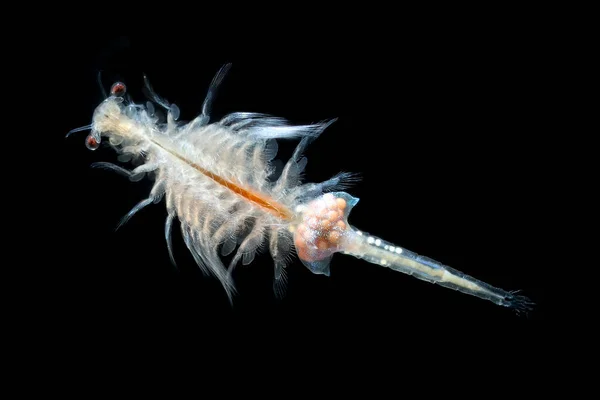
The only disadvantages of this food source are finding a reliable seller, finding a way to store live food till when they are needed, and dealing with the cost of buying food.
For these reasons, many hobbyists feed their Bettas with a varied diet consisting of other alternative food sources like freeze-dried foods, betta fish pellets, and flakes.
Freeze Dried Foods
Freeze-dried food is a viable alternative, especially if you do not have a reliable storage system for live foods. Some are frozen, and others are dried. Freeze-dried bloodworms, brine shrimp, and small fish are some great alternatives that your bettas thrive on.
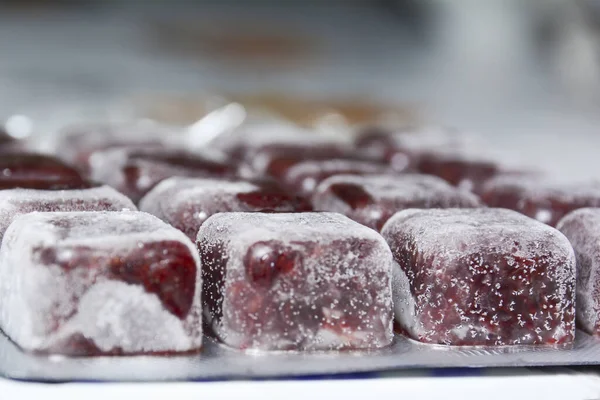
But you would have to first thaw the food before allowing your betta fish to eat it.
Floating Betta Fish Pellets
These pellets are often insect-based, but there are many other variations. They have all the nutrients your betta fish needs and are a far better choice if you are interested in buying food that will nourish your betta fish well and store well.
Betta fish pellets are the right food for your bettas because they contain all the nutritional requirements that your betta fish needs to survive. And most importantly, they float so that your betta can spot them and eat them.
Betta Flakes
There are different flakes in the market, so you must buy betta fish flakes to avoid feeding betta fish goldfish flakes.
You can add betta flakes to your betta fish diet if you want to give them a varied diet. But remember that flakes tend to sink faster than other food options. So the uneaten food will usually rot and negatively impact the water quality in the tank.
It would be best to feed Betta flakes scarcely, especially if you house Bettas in a small tank. Also, although you want to buy Betta flakes, it would be unwise to buy Betta tropical fish food because they are mostly full of plant matter.
Remember that plants matter is not the right food for your Betta fish.
Can Bettas and Goldfish Co-Habit in the Same Tank?
Although this may seem like a great way to reduce your care routine and get on with life, it is not advisable. There are many reasons you should not have both fish in the same tank, but the most important is that your goldfish is likely to die from eating Betta food due to the high protein level.
Other reasons are the difference in the water parameters that each fish species prefer and their tolerance to ammonia spikes in the water.
Goldfish are not as sensitive to water parameter changes as Bettas. They also prefer a lower water temperature to Bettas, who prefer warmer water temperatures.
Feeding Frequency for Betta Fish
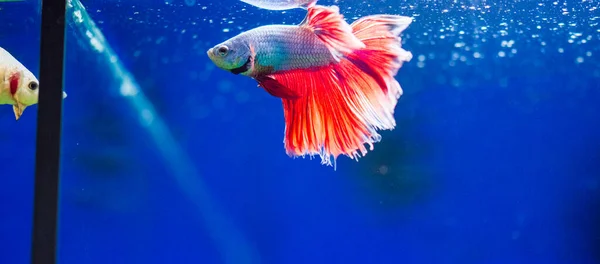
Feed your betta fish scarcely to prevent overweight from the protein-rich food. The feeding frequency should be once or twice a day but in small quantities. A small pinch of betta flakes should do. For pellets, one or two is enough.
Suppose you wish to feed them frozen food, whether brine shrimp or blood worms, a small quantity at a time is ideal. You can also give them mosquito larvae, but only a small quantity at a time.
It would be best to try a varied diet to see what your fish likes the most. And you may skip feeding for a day occasionally. This will limit the chance of being overweight and keep your fish hungry enough to try out other foods you offer.
What Should an Ideal Betta Food Contain?
The proper diet for Betta fish must contain more protein than fillers, wheat, soy, and even fish meal.
Ensure that your Betta foods are rich in protein from a quality source. This high amount of protein is what you need to give your carnivorous bettas a balanced diet.
You can also check the product for the exact protein quantity (in percentages) and the source, whether it is wild salmon or another type of fish. Some products generalize them as “crude protein.”
You also want to get a betta fish food that is mess-free to prevent food rot in the tank as much as possible.
Final Thoughts
While betta fish can eat goldfish flakes, that would be a poor diet for the betta fish. Bettas are largely carnivores and require foods high in protein levels to s satisfy their carnivorous needs.
There are a few tips you must always remember. Feed betta fish food scarcely to prevent overweight and other health issues. You can skip feeding for a day once in a while and ensure to try out varieties to know what your betta fish likes the most.
Related Interesting Reads:

